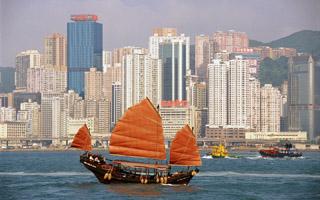Situated between
Hong Kong Island and Kowloon
Peninsula in Hong Kong, Victoria Bay is the largest harbor in China
and the third largest in the world, after San Francisco in the
United States and Re de Janeiro in Brazil. It is home to most of the
ports of Hong Kong, making Hong Kong one of the world's busiest
ports. The harbor bustles day and night with all manner of
watercraft – from the historic Star Ferries to cruise liners, cargo
ships, and wooden fishing vessels.
Origin of the Name:
The harbor was named after the British Queen Victoria,
who was on the throne for 63 years (1837 - 1901), the longest in the
history of the Great Britain. During her reign, the Great Britain
enjoyed unprecedented cultural and economic prosperity. However,
after he had been on the throne for only 3 years, in 1840, Great
Britain waged the First Opium War with China. Following the war, the
Nanjing Treaty was signed, as a result of which Hong Kong Island
became a Concession of Britain. Later in 1860 after the Second Opium
War, China was forced to sign the Peking Treaty, and in 1861 Kowloon
Peninsula was also ceded to Britain. In April of that year, the bay
between Hong Kong Island and Kowloon Peninsula was named Victoria
Harbor. As the natural center of the territory's dense urban region,
the harbor has played host to many major public shows, including the
annual fireworks staged on the second night of the Lunar New Year,
and its promenades are popular gathering places for tourists and
residents.
Four Sites for Grand Harbour View:
Long famous for its stunning panoramic views, the
harbour is a major tourist attraction of Hong Kong. A myriad of
lights twinkles at night from the skyscrapers on Hong Kong Island
and Kowloon Peninsula, making Hong Kong, together with Hakodate in
Japan and Naples in Italy, included in the "three best night scenes
of the world".
Symphony of the Lights:
In 2004, the Hong Kong Tourism Board introduced a show
dubbed A Symphony of Lights, featuring nightly more than 40 Hong
Kong's skyscrapers in a stunning multimedia extravaganza. On Nov.
21, 2005, the show was listed in Guinness World Records as the
world's largest permanent light and sound show.
Victoria Peak:
At a height of 554m, Victoria Peak is the highest
mountain in Hong Kong. Victoria Tower on the Victoria Peak can be
counted as the best place to view the enchanting night view.
Avenue of Stars:
The Avenue of Stars, situated along the Tsim Sha Tsui
Promenade, allows for spectacular harbour views. It was built to
honor the most illustrious people the Hong Kong film industry has
produced over the past decades.
Golden Bauhinia Square:
Golden Bauhinia Square is located outside the Hong Kong
Convention and Exhibition Centre on the Wan Chai waterfront.
Surrounded by Victoria Harbor on three sides, it rests at the center
of the Harbor, making it a great site for harbor view.
Victoria Harbor Cruise:
There is no better way to capture the magic of the
harbor than by taking a cruise aboard a ferry.
Star Ferry is second to none for a Victoria Harbor
cruise. It was once listed in the top 50 places of a lifetime by
National Geography. On top of the ferry service between Hong Kong
Island and Kowloon Peninsula, it also provides a two-hour nighttime
cruise, during which visitors are able to enjoy the Symphony of
Lights in a unique way.
Duk Ling is a carefully restored authentic Chinese
fishing junk and has been used for harbor cruises in Hong Kong
waters for about 150 years ago. Tourists can aboard the Duk Ling to
transfer between the Tsim Sha Tsui Star Ferry Terminal and Hong Kong
Island Central Pier 9.
Named after the most famous pirate in Hong Kong of the
last century, Aqua Luna is possibly the last handcrafted traditional
Chinese red-sail junk built with age-old designs and traditional
materials. It plies between Tsim Sha Tsui Pier 4 and Central Queen’s
Pier. |

